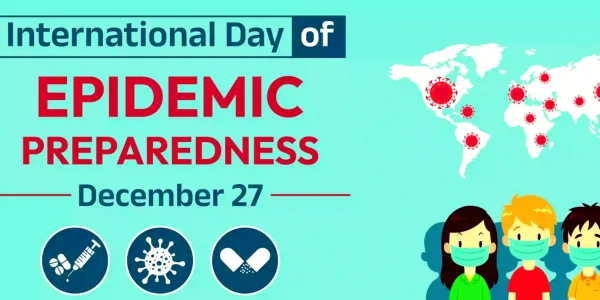The International Day of Epidemic Preparedness, observed annually on December 27, is a United Nations-designated day aimed at raising awareness about the critical need for epidemic prevention, preparedness, and response. This day underscores the importance of global solidarity, collaboration, and proactive measures to mitigate the devastating impact of infectious diseases.
Established in the wake of the COVID-19 pandemic, the observance serves as a reminder of the lessons learned and the steps required to safeguard public health and global well-being.
History and Origins

The United Nations General Assembly (UNGA) proclaimed December 27 as the International Day of Epidemic Preparedness in 2020, through Resolution 75/27. This initiative followed the unprecedented challenges posed by the COVID-19 pandemic, which highlighted the vulnerabilities of global health systems and the far-reaching consequences of unpreparedness.
The resolution was championed by Vietnam and supported by numerous member states, emphasizing the need for international cooperation, robust healthcare infrastructure, and effective communication to address future outbreaks.
Why Epidemic Preparedness is Crucial
Epidemics have shaped the course of human history, causing immense loss of life, economic disruptions, and social instability. The International Day of Epidemic Preparedness emphasizes:
- Prevention Over Reaction: Proactive measures, such as vaccination programs and early detection systems, are more effective and cost-efficient than reactive responses to outbreaks.
- Strengthening Health Systems: Investing in healthcare infrastructure ensures that countries can respond swiftly and effectively to public health emergencies.
- Global Solidarity: Infectious diseases know no borders, making international collaboration essential to prevent and manage outbreaks.
- Protecting Economies: Epidemics often lead to significant economic losses. Preparedness helps minimize disruptions to trade, travel, and livelihoods.
Lessons from the COVID-19 Pandemic
The COVID-19 pandemic exposed weaknesses in global health systems and underscored the need for better preparedness. Key lessons include:
- The Importance of Early Warning Systems: Delays in detecting and reporting outbreaks can exacerbate their impact.
- Equitable Access to Healthcare: Disparities in vaccine distribution and healthcare access highlight the need for global equity.
- The Role of Science and Innovation: Rapid development of vaccines and treatments demonstrates the power of research and innovation.
- Community Engagement: Public trust and participation are vital for effective epidemic responses, from vaccination campaigns to public health measures.
Global Efforts in Epidemic Preparedness
Several international initiatives and organizations are dedicated to strengthening epidemic preparedness:
- World Health Organization (WHO): The WHO plays a central role in coordinating global health efforts, providing technical support, and monitoring disease outbreaks.
- International Health Regulations (IHR): These legally binding regulations require countries to report public health events and collaborate on containment measures.
- Coalition for Epidemic Preparedness Innovations (CEPI): CEPI funds research and development of vaccines for emerging infectious diseases.
- Global Health Security Agenda (GHSA): This partnership works to strengthen health systems and improve global capacity to prevent, detect, and respond to infectious disease threats.
Themes and Focus Areas
Each year, the International Day of Epidemic Preparedness highlights specific themes to address emerging challenges. Themes often focus on:
- Strengthening Healthcare Infrastructure: Emphasizing investments in hospitals, laboratories, and workforce training.
- Community Awareness: Educating the public about preventive measures, such as hygiene and vaccination.
- Global Collaboration: Promoting partnerships among governments, organizations, and communities.
- Resilience Building: Ensuring that countries and communities are equipped to withstand and recover from outbreaks.
How the Day is Observed
The International Day of Epidemic Preparedness is marked by various activities aimed at raising awareness and fostering action:
- Educational Campaigns: Governments and organizations host workshops, webinars, and public discussions on epidemic prevention and preparedness.
- Policy Dialogues: Policymakers and experts discuss strategies to strengthen global health security and reduce vulnerabilities.
- Community Engagement: Local initiatives, such as health fairs and vaccination drives, promote awareness and participation.
- Media Outreach: Social media campaigns, documentaries, and public service announcements highlight the importance of epidemic preparedness.
How You Can Contribute
Individuals play a vital role in supporting epidemic preparedness. Here are some ways to contribute:
- Stay Informed: Keep up-to-date with reliable information about infectious diseases and public health guidelines.
- Promote Hygiene Practices: Encourage handwashing, proper sanitation, and other preventive measures in your community.
- Support Vaccination: Advocate for and participate in vaccination programs to protect yourself and others.
- Raise Awareness: Use social media or community platforms to educate others about the importance of epidemic preparedness.
- Volunteer: Assist local health initiatives or emergency response efforts in your area.
Looking Ahead: A Resilient Future
The COVID-19 pandemic was a stark reminder of the interconnectedness of our world and the urgent need for preparedness. Building a resilient future requires:
- Investing in Research: Continued support for vaccine development, diagnostics, and treatment options.
- Fostering Equity: Ensuring that all countries, regardless of income level, have access to essential health resources.
- Enhancing Communication: Transparent and timely communication during outbreaks to build public trust and facilitate effective responses.
- Promoting Collaboration: Strengthening partnerships among governments, international organizations, and civil society.
Conclusion
The International Day of Epidemic Preparedness serves as a crucial reminder of the importance of vigilance, collaboration, and proactive measures in safeguarding global health. By learning from past outbreaks, investing in health systems, and fostering a culture of preparedness, we can mitigate the impact of future epidemics. This day calls on individuals, communities, and nations to work together to create a world where health crises are anticipated, managed, and ultimately minimized. Let us use this day as an opportunity to prioritize health security and protect the well-being of generations to come.

